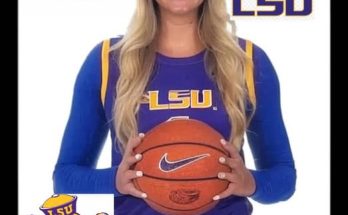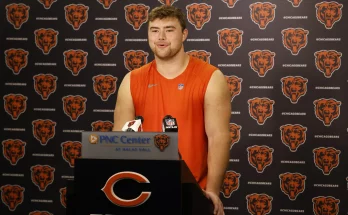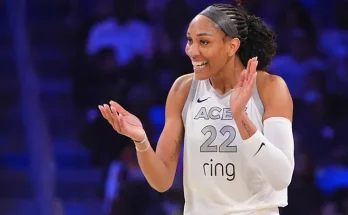Quinn Ewers remembers it like it was yesterday. He was just a seventh grader in Southlake, Texas, still learning how to read defenses, still figuring out the mechanics of a deep ball. He’d been playing football for as long as he could remember—Pee Wee leagues, flag football, backyard battles with older kids in the neighborhood. But nothing could have prepared him for what happened one afternoon, when he was told a Division I college football program wanted to offer him a scholarship. He was 13.
Now, several years and a whirlwind career later, Ewers can’t help but smile at how surreal that moment was. Sitting with reporters in Austin, the Texas Longhorns quarterback reflected on the early offer that thrust him into the national spotlight before he even got his braces off. “It was wild, man,” Ewers said. “You’re in middle school, and a college coach is telling you, ‘Hey, we think you could play for us one day.’ At that age, it doesn’t even feel real.”
Ewers didn’t name the school, but the buzz at the time centered around several top programs in the Big 12 and SEC. It wasn’t just an isolated incident—Ewers was part of a growing trend of pre-high school athletes being offered scholarships based on projection, potential, and a couple of viral highlight reels. The moment marked the beginning of what would become an intense recruiting saga for one of the most highly rated quarterback prospects of the modern era.
The now 22-year-old signal-caller is mature beyond his years, and his words reflect the wisdom of someone who has been through the wringer of media scrutiny, fanfare, and high expectations. He knows now what he didn’t know then: how heavy the spotlight can feel when you’re told you’re “the future” before you’ve even had a growth spurt.
“I think at that age, you’re just trying to enjoy the game,” he said. “You’re trying to have fun. But the second those offers start coming in, everything changes. People start looking at you different. Coaches treat you different. The pressure hits way earlier than it probably should.”
Ewers doesn’t blame anyone. In fact, he’s quick to point out how supportive his parents were in keeping him grounded. “My mom and dad were great about it. They never let it get to my head,” he said. “They always reminded me, ‘You haven’t done anything yet.’”
But there’s no denying that being labeled a phenom so young had its effects. The pressure to live up to the hype followed him throughout his prep career at Southlake Carroll, where he put up video game numbers and cemented himself as the No. 1 overall player in the country in the class of 2022. By the time he was a junior, his name was already being mentioned in the same breath as Trevor Lawrence, Justin Fields, and other generational quarterback talents.
Ewers eventually committed to Ohio State, where he reclassified to enroll early. The decision was tied in part to the emerging world of Name, Image, and Likeness (NIL) deals—Ewers reportedly signed a seven-figure endorsement deal before throwing a pass in college. But his time in Columbus was short-lived. He saw limited action behind C.J. Stroud and decided to transfer to Texas, where he found a fresh start and a clearer path to the starting role.
Now, with multiple seasons under his belt and an NFL future in sight, Ewers is reflective. He’s come a long way from that 13-year-old with the spiky blond mullet and a cannon arm. He’s grown—physically, mentally, emotionally. And while the scholarship offer in middle school helped put him on the map, he admits it also came with complications most kids his age weren’t ready to handle.
“There’s a difference between being good at football and being ready for everything that comes with it,” he said. “When you’re young, you don’t see all the behind-the-scenes stuff. The media attention, the expectations, the hate online—it can mess with you.”
He pauses, looking off into the distance. “There were days I didn’t even want to check my phone.”
Ewers isn’t the only player who’s been offered that early, but he might be the most recognizable face of the phenomenon. As recruiting has gotten more competitive, and NIL has opened new doors for marketing potential, programs are increasingly rolling the dice earlier. A seventh-grade scholarship offer would’ve once been dismissed as a publicity stunt. Now, it’s become part of the new normal. Kids barely in puberty are being ranked, analyzed, and offered future spots at major programs before they’ve even played a high school game.
“I don’t think it’s fair to the kids,” Ewers said bluntly. “I get that it’s part of the business, and I know coaches want to get ahead. But how do you know who a kid is gonna be when he’s 12? You don’t. You can guess. But you don’t know.”
The NCAA doesn’t officially recognize verbal offers to middle schoolers, and those early offers aren’t binding. But that hasn’t stopped coaches from making them. And for players, even the suggestion that a program wants you can lead to pressure that far exceeds the joy of the sport itself.
Ewers thinks there should be more safeguards. Not necessarily rules to stop it, but better support systems for kids navigating the process. “It’s not just about whether the kid can throw a spiral,” he said. “It’s about whether they have people around them who are looking out for their well-being.”
For Ewers, he did. His parents were a constant presence. His high school coaches protected him from overexposure. And even though he admits to making a few mistakes along the way—reclassifying early, transferring schools—he’s grateful for the journey and says it made him stronger.
“It’s part of my story,” he said. “All of it. The early hype, the struggles, the bounce-backs. I wouldn’t change it.”
When asked if he would ever offer a scholarship to a seventh grader if he were a coach one day, Ewers chuckled. “No chance,” he said. “I’d wait until I could see who the kid really is—what kind of teammate he is, how he responds to adversity. That stuff matters way more than how far he can throw at 12.”
Still, he doesn’t regret being offered so early. “It gave me a platform,” he acknowledged. “It opened doors. And at the end of the day, I love this game. Always have. That hasn’t changed.”
As for the kids coming up now—the next wave of middle school quarterbacks already going viral on Instagram and TikTok—Ewers has one piece of advice: don’t rush it.
“Enjoy being a kid,” he said. “You’ll have time to be a star. You’ll have time to sign deals, go to camps, get ranked. But you only get one shot at being 12 years old. Don’t let this game take that away from you.”
He smiles again, maybe thinking about his younger self—the seventh grader in Southlake, just happy to be on the field, blissfully unaware of what was coming. “It’s a journey,” Ewers said. “It’s supposed to be fun.”
And maybe, just maybe, it still is.



